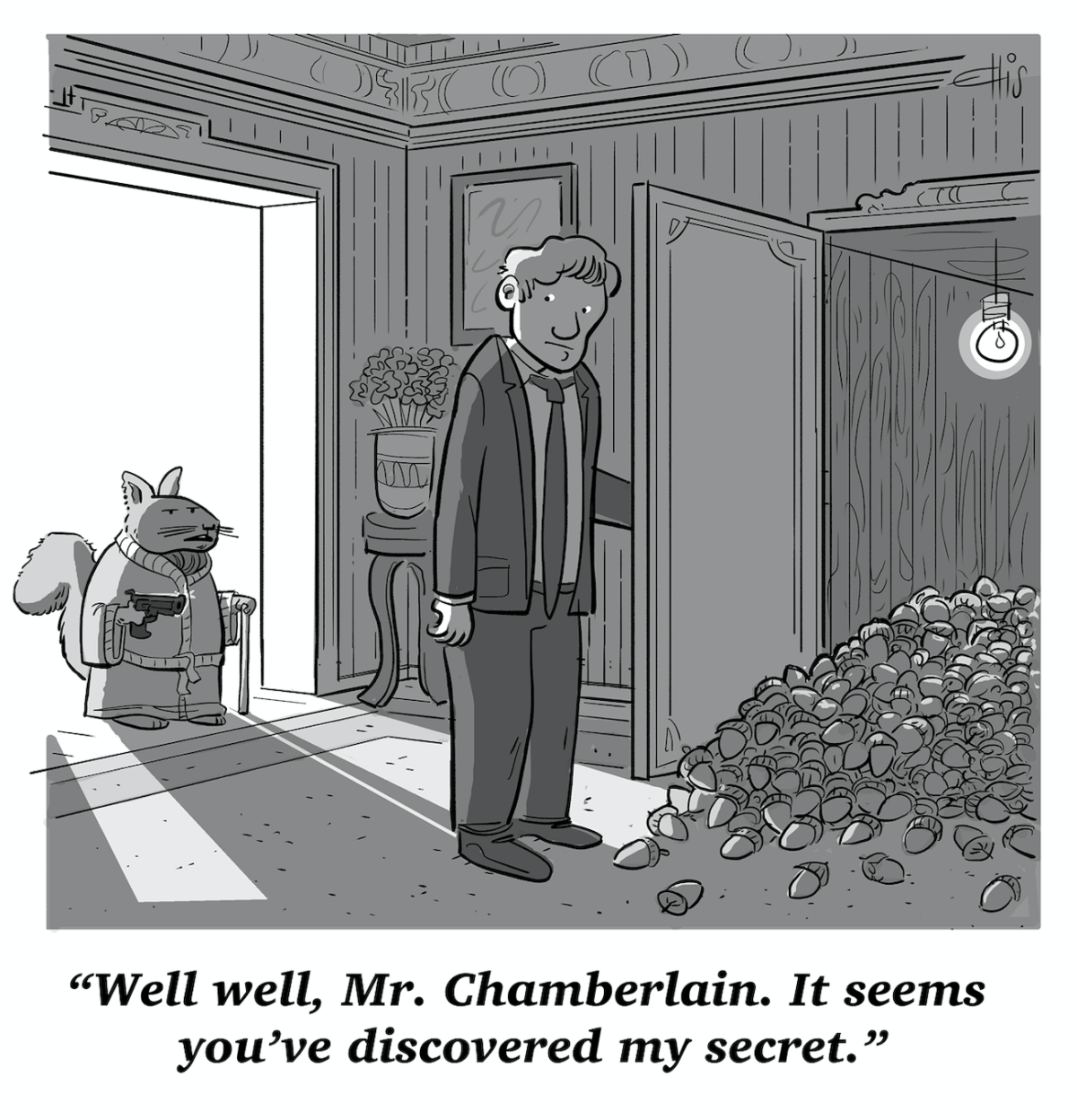
Last summer, a very bad hardware failure took TVtropes.org—the wiki that catalogues storytelling conventions—offline. After only a few hours, the website’s users, called tropers, began to worry about the existence of a full backup. “Could it end so suddenly? Just like that?” one wondered. “Would any of us have the determination to rebuild a cultural database from scratch?”
TV Tropes launched in 2004, but it was born before that, as an urge in the comments section under Salon articles. “Every time something came up about television in a Salon story, there was this group that would go on these rampages about Buffy. Eventually we moved our community away so as not to bug everybody,” the mysterious coder who, under the nom de Web “Fast Eddie,” raised TV Tropes in his basement and ran it off of stitched-together Windows servers explained to Annalee Newitz in an ultra-rare phoner. Buffy the Vampire Slayer had rebooted television into a medium worthy of serious attention, by mashing up genres and riffing on formula. The show functioned as an auspicious origin story for TV Tropes, the scope of which crept out to cover not only television, but media’s gamut: from advertising to toys, touching everything from parlor games to manga along the way.
As of this March, tropers have discerned 30,065 tropes. “We collect them, for the fun involved,” they say. Historically, the tropes have been given names like Ben and Jerry flavors: Strawberry Shorthand (“Strawberries as symbolism.”), Eenie, Meenie, Miny Moai (“Moai statues automatically make a setting cooler and more exotic.”), and Diamonds in the Buff (“Wearing jewelry—and nothing else.”). Each trope is entered with a description and examples. Emily Nussbaum has called TV Tropes the “most useful site on the web.” It may be a nerdfest bent on déjà vu, but TV Tropes is epiphanic: part-Reddit, part-Name That Tune. You are looking at one of our best pop-culture resources.
“I surf Tropes to generate ideas,” Ellis Rosen, a cartoonist for The New Yorker, told me. (So do many of his colleagues.) “I’m pressing the Random Trope button to see what comes from that. Or I’m looking at an entry to clear up what the trope is, exactly—or sometimes,” he said, “I’m working backwards, trying to figure out what I’m riffing on.”
Next year, Little, Brown will publish a visual anthology, edited by Rosen and Jon Adams, of one of cartooning’s favorites: the desert-island. This is the gag TV Tropes styles as “Far Side” Island, à la Gary Larson. (“A tiny island with a single palm tree.”) Larson popularized the trope for recent audiences, but it appeared in The New Yorker’s pages in the thirties, and in Punch before that. “When I first began submitting,” Rosen said, “it was important to me that I try to sell a desert-island one. I really wanted to be part of that tradition.”

Once upon a time, many moons ago, we knew a world where “Far Side” Island and Schmuck Banquet didn’t exist. We just cannot remember it. Some tropes, like Achilles’ Heel, are Older Than Dirt. Some, like Happy Ending and Fourth Wall, are Omnipresent Tropes. There are prestige tropes, like Real Is Brown (“Desaturated colors automatically means more realistic.”), and Trope Tropes “about how tropes come into existence, live, mutate, evolve, and die.” The tropes are tools. You can shoot straight with or subvert them, but they’re “neither bad nor good,” the community has claimed. “If your favorite shows have long lists of tropes associated with them, well, so does everybody’s.”
Why should such a curious lot of people care to keep a master list of them?
Drew Schoentrup, an intellectual property attorney, met Chris Richmond, a tech whiz, when he answered a Craigslist post for a roommate in San Diego. The pair of twenty-somethings had become business partners in a streaming venture by 2013, but they were getting aced out of that space by Netflix and Amazon. Schoentrup told Richmond they needed to buy property with its own content. “I went on AdWords to look at the top entertainment sites,” Richmond said. He clocked TVtropes.org. “What the hell is TV Tropes and how is it getting that many page views?” he asked himself. On its homepage, Richmond realized he’d been there many times: he’d just never really understood what TV Tropes was. “The site’s design was very dated, it had endless unique content and clearly wasn’t owned by a major corporation,” he said. “I told Drew, this is the one.”
Fast Eddie had embarked on TV Tropes in his fifties. He’d been at it for a decade; now, his health was failing, and he was ready to bow out. That is why, he told Schoentrup and Richmond, he’d sell his wiki to them.
The West Coast hopefuls met with dozens of banks to ask for a $2 million loan. “Imagine trying to explain TV Tropes to a banker in 2013,” said Richmond. “Not easy.” It took a year, by which time the ad-run site was performing better, and Fast Eddie wanted a higher price. The parties agreed on $2.5. (Schoentrup and Richmond also own Salon and half of Snopes.) “He walked me through all the servers and code for the site one time, and then I had to take it from there,” Richmond said.

TV Tropes was more of a fixer-upper than the upstarts had bargained for. After a decade of editing and patching open-source software to customize it, the wiki’s backend needed beaucoup help. The codebase had to be gutted, and the site had to migrate to new servers. There was “no template,” “no simple way to make a change across the site,” Richmond remembered. “Literally hundreds of files of code connected to build a page. And I was shocked he somehow had this all running on these Windows servers at the scale Tropes was at.” They joked that Fast Eddie was a Beautiful Mind-type genius.
Richmond (who still finds things in the code) regards the renovation of the heavily trafficked site as his most difficult tech project. After setting up a Kickstarter to fund the work—and receiving twice their $50k goal—it took him and his team of developers north of a year to do. The summer outage was a scare to fans of the crowd-sourced heritage site. They’d sent “a ton” of messages in alarm. But TV Tropes went up, intact, fourteen hours later. “We switched to a new hosting company over it,” Richmond told me. But he said there had never been a chance, as many feared, of losing everything.
You can navigate the site by trope or by media, or browse under indexes, such as Slapstick and The Cameo. You can pull up Bridgerton to gander (and gasp) at tropes galore, from A-W, including Contraception Deception. The Trope Launch Pad, where new tropes are proposed, debated, and voted on, is not for faint hearts. But like Rosen, I enjoy clicking the blue button in the site’s header, which spits out tropes at random, as well as visits to the Trope Finders board, where stumped tropers avail for help.

“Do we have anything,” a post I once read went, “for when say vampires or demons are able to substitute their diet of human blood/flesh/souls with something artificially made (either magical or scientific) like say Tru Blood from well True Blood?”
After an hour, someone had replied with Addiction Displacement. “Vegetarian Vampire, too,” added another. The latter is defined as “Vampires who don’t (or try their best not to) feed off human blood.” My mind ran to “Vampires in the Lemon Grove,” Karen Russell’s short story about an undead married couple. In it, Clyde, the husband, narrates how they tested “a thousand beverages purported to have quenching properties”—Moroccan mint tea, Alabamian Cherry Coke floats—and eventually, in Sorrento, sank fangs into an alternative that was non male. Citrus like “summer moons.”
On the veggie vamp page, I clicked open the examples in literature. Russell wasn’t listed. So, I became a troper. I edited the entry, noting that before Clyde’s wife turned his lifestyle, he had read about their kind in books and—similar to the lead in George Romero’s vamp flick Martin—“did only what the stories suggested.” Clyde flourished a velvet cape. Shrank from garlic and sunlight—snoozed in a casket. I linked to Discredited Trope. (“A trope that no one plays straight anymore, lest they face ridicule.”) And to When Life Gives You Lemons….
On TV Tropes, one door opens onto another. Before you know it, you’re studying the Furniture Tropes index. The Bs include Blanket Tug O’ War, Banister Slide, and Bathtub Mermaid. (“Mermaids or other aquatic folk being kept wet in a tub, tank, or other container.”) In the examples for live-action film, Splash and The Shape of Water were there, of course, but not Miranda or Mr. Peabody and the Mermaid—both rom-coms out in 1948, both with sirenic leads in a soak. I added them. Cowabunga! It was thrilling! But as good as it feels to mount evidence, it must be wild to spot and document a living, breathing trope. Who wouldn’t wish to collar one? The appeal of doing so regularly attracts dilettantes to the Trope Launch Pad.
“Our long idea is, there’s the wiki side and there’s the forum side,” said John Aldrich, a forty-five-year-old data analyst based in Bethlehem, Pennsylvania, who has served for a decade as one of the site’s moderators. (Aldrich’s handle is Fighteer, after an avatar he created when he was seven.) Super tropers, who pour their off-hours into the site, tend to labor on forum side. “Nowhere is that better represented than in the Trope Repair Shop, where problems with tropes go to get fixed,” Aldrich explained to me. “Anybody can initiate a repair topic, which a mod has to approve, but only so many people are willing to make all the effort. It’s mostly the super tropers who hang out in Trope Repair and in the project threads.”
“The great power of the internet,” Aldrich went on, “is that it lowers the barriers for forming communities.” Indeed, TV Tropes sees traffic from across the globe. Probably the best indicator of where tropers live, Richmond had told me, is to look at the timezones accounts are set to. Of 426 specific options, 321 are registered. Each month, thirty thousand tropers log on to make north of 250,000 edits. Because as much as an instinct exists to make stories, there is also this undeniable urge to take them apart and mumble about the mechanisms.
The drive hits its stride online, where the know-it-all culture of the web and social media gives stage to witlings, wisenheimers, and trolls. The collaborative encyclopedia can suffer from that—but not so much as you might think. Its worst malcontents say management is “grammer nutzee” (sic). That the site is lousy with Social Justice Warriors. And to be sure, a wiki is going to wage edit wars. (Such behavior can get you booted.) Every e-colony has drama, petty and pedantic. Above the fandoms and hatedoms, the overarching debate is between Lumpers and Splitters, who essentially disagree about how subtle a trope should be. “The way Tropers handle this deep philosophical divide,” explains the site,
is for splitters to write finely-distinct entries and for lumpers to write overview entries that list the “splits.” We call those lumper pieces “indexes” or Super Tropes, and each of the splits is a Sub-Trope. The Other Wiki would not appreciate this. We must never tell them. The Other Wiki calls these “mergist” and “separatist.” Which, you will note, is a split.
“Newer tropers are more prone to splitting. It’s somewhat low-hanging fruit,” Aldrich allowed. “Eddie was a famous Lumper. He used to say that he was looking for the Ur-trope.” A bucket big enough to bin every yarn we have ever yakked. “Though, that might’ve been apocryphal.”
Almost nothing is known about the mastermind behind this hivemind monument. “Fast Eddie” is the name of the titular character in The Hustler. “Fast Eddie” is also the name of a character in a series by the sci-fi writer Spider Robinson: a piano man who doubles as a bouncer and clubs anyone who asks a “snoopy question.” In any case, I had the anonym’s phone number and cold-called him.
Why Fast Eddie? I asked. “I’m pretty good at pool,” he admitted, shyly. The founder was patient and humble, but wisdomatic, and also encouraging of wide-eyed tropers like myself. “We’re all amateurs at this,” said Fast Eddie. He came off as Cool Uncle X The Wise Prince, with an unpindownable accent on account of moving around a lot as a kid while his dad was in the military. (Some of the bits and bobs about TV Trope’s founding are fictive, but because the mythology upholds TV Tropes, it won’t be dispelled here.) About once a month, Fast Eddie still drops by the site. “I get in there for several hours,” he told me, “and at some point I go You’re doing it again, dude.”
“I gave up chasing the trouble tropes,” Eddie continued. But he harbors a watchlist of tropes that date to when the site was young, which include Breather Episode, Walking the Earth, and Hollywood Homely. “The reason I track these,” he said, “is that people keep trying to rewrite them, and I just like to keep the language clear.”
Wiki-based communities like TV Tropes educate themselves organically, and when they don’t, mods like Aldrich and six or so others intervene. “We especially keep a lid on breathless editing,” when users spam references to everything under the sun, “because that’s not of quality,” Aldrich said, “and besides—tropes isn’t a hot-off-the-press site.” Sometimes, things go to knots. Not long ago, thinking that representation is not in itself a trope, the mods decided to cut Badass Gay.
“It didn’t sit with many who’ve been told they don’t exist by the media and politics, and who desire for representative,” said Aldrich. “The eventual outcome was a very polite and reasoned-out forum conversation about what actually is and isn’t a trope by our criteria,” he said. But not before someone trolled the scene by trying to launch the trope Gay. The proposal attracted hundreds of people, “commenting, some getting the joke and some not getting the joke.”
One of the mods’ nonstop headaches is Five-Man Band. “It’s one of the worst tropes for shoehorns, and there’s a dedicated cleanup thread for it to this day,” Aldrich groused about the formula that was carried from music into shows like Power Rangers. In sum, “One leads, one contrasts, one thinks, one lifts, and one keeps the four others from killing one another.” Traditionally, that last member has been The Chick; now, they are also referred to as The Heart. In Scooby Doo, Daphne is The Chick and Velma is the Smart Guy, and that is good to know, isn’t it?
Some have the impression that TV Tropes disparages the efforts of people trying to telling stories. “Not so, but they are very verbal,” Fast Eddie had told me. The mentality is known as Measuring the Marigolds. (“People who understand something too well can’t appreciate it(s beauty).”) “We put together this site to get a vocabulary, so you can talk to your friend about Flashback and both know what you’re talking about. The more you study a thing, the more you honor it,” he insisted. For that reason, we pop the hood on stories and examine their working parts. We amass a motherlode of archetypes. And visit the wiki as we would a museum.
It is deeply satisfying to go there and reckon with the patterns made over time, across culture, medium, and genre—and to catch them in rotation. As when Dan Chiasson looked at 2001: A Space Odyssey fifty years later, and remarked that “The dying HAL, singing ‘Daisy,’ the tune his teacher taught him, is a sentimental trope out of Victorian fiction, more Little Nell than little green man.”
Whatever discomfort dogs creativity, the ultimate upset here is that the membrane between the universes of make-believe and reality is so porous. TV Tropes therefore also lists veracious examples from history and every day life. The Roman recipe for long-lasting concrete, which called for volcanic ash and animal blood, was mislaid, for instance, and the Haya people, of what is now Tanzania, were forging high-end steel as early as 100 A.D., but stopped. That’s Lost Technology. A murmuration of starlings certainly looks as if it could coalesce into a hammer and wallop you like the bugs do in Saturday morning cartoons. That’s Synchronized Swarming. Stephen King’s agent called and asked him if he was sitting down before delivering the news that his first novel, Carrie, had sold for a very tidy sum. That’s Dramatic Sit-Down. So maybe that reality check is the most time-honored trope of them all.




